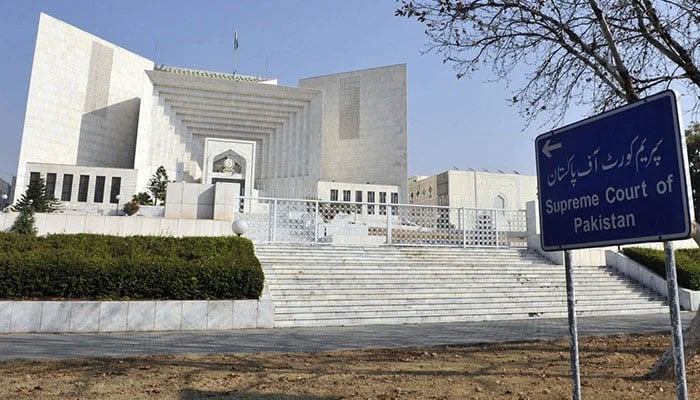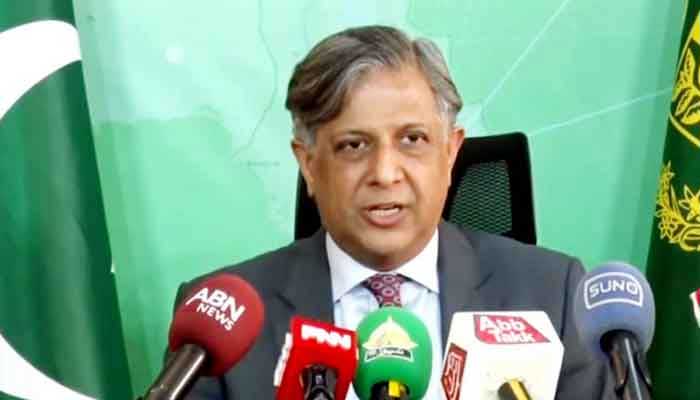SC declares ECP order 'null and void', rules to hold elections in Punjab on May 14
Court upholds President Alvi's decision; decides to continue hearing on Khyber Pakhtunkhwa elections date
ISLAMABAD: In a major development, the Supreme Court of Pakistan on Tuesday declared the Election Commission of Pakistan's (ECP) verdict on delaying polls in Punjab "null and void", upholding President Dr Arif Alvi's decision to hold polls on April 30.
A three-member bench — led by Chief Justice of Pakistan (CJP) Umar Ata Bandial and comprising Justice Munib Akhtar, and Justice Ijazul Ahsan — reserved the verdict on Monday after holding week-long proceedings on the Pakistan Tehreek-e-Insaf's (PTI) petition.
"The impugned order dated 22.03.2023 (“EC Order”) made by the Election Commission of Pakistan (“Commission”) is declared to be unconstitutional, without lawful authority or jurisdiction, void ab-initio, of no legal effect and is hereby quashed," the written verdict, released minutes after it was announced, read.
The ECP postponed the date of the election in Punjab to October 8 — initially scheduled to take place on April 30 — citing a resurgence of terror attacks, a shortage of security personnel and an unprecedented economic crisis.
"Neither the Constitution nor the law empowers the Commission to extend the date of elections beyond the 90 days period as provided in Article 224(2) of the Constitution," the verdict mentioned.
The electoral process was at its fifth stage when the ECP announced its decision due to the "unlawful order made by the commission" 13 days have been lost.
Punjab Assembly — then controlled by former prime minister Imran Khan’s party — was dissolved on his instructions in January. The cricketer-turned-politician has been pushing for a fresh election in the province in addition to his demand for early national elections — both of which he views as a way for Pakistan to achieve political stability and help bolster its struggling economy.
Key takeaways from Supreme Court verdict
- ECP order of March 22 declared unconstitutional
- SC directs ECP to hold elections in Punjab on May 14
- Federal govt directed to provide Rs21bn in funds to ECP by April 10
- ECP asked to submit a report to SC on the issue by April 11
- Govt directed to share the security plan with ECP by April 17
- Apex court to continue hearing regarding elections in KP
The court restored the schedule for the Punjab polls with few changes. The phases of stage 6 to stage 11 of the election programme were restored.
The verdict mentioned that the last date for submitting appeals against the returning officer's decision is April 10 and it also directed the Appellate Tribunal, Punjab to announce decisions on appeals filed by April 17.
"The final list of candidates in Punjab should be released by April 18, the election symbols should be allotted by April 20 and the last date for the nomination papers is April 19," it said.
Updated schedule of election in Punjab:
| Last date for filing appeals against decision of the returning officer rejecting/accepting the nomination papers | April 10 |
| Last date for deciding of appeals by the appellate tribunal | April 17 |
| Publication of revised list of candidates | April 18 |
| Last date for withdrawal of candidature and Publication of revised list of candidates | April 19 |
| Allotment of election symbol to contesting candidates | April 20 |
| Polling day | May 14 |
According to the schedule, the court directed the ECP to hold polling on May 14, directing it to conduct the general elections to the Punjab and KP assemblies "honestly, justly, fairly and in accordance with the law, as required in terms of article 218(3) of the Constitution".
The verdict stated that the polling in Punjab should be on May 14. It directed the ECP to conduct fair and transparent elections under Article 218(3).
"Elections in Punjab and KP should be transparent, impartial and as per the law," the verdict added.
It stated that the federal government should provide Rs21 billion in funds by April 10 to the ECP and directed the body to present a report on the issue by April 11.
"The Commission shall, by 11.04.2023, file a report in the Court stating whether the said funds have been provided and received and if so, whether in full or in part. The report shall be placed before the members of the bench for consideration in Chambers. If the funds have not been provided or there is a shortfall, as the case maybe, the Court may make such orders and give such directions as are deemed appropriate to such person or authority as necessary in this regard," it read.
The verdict also said that the Supreme Court will issue instructions to the authorities concerned in case the funds are not provided.
The apex court also directed the federal government to provide resources — including Rangers, FC personnel, and armed forces — and extend support in order to hold polls in the provinces.
"[...]the Federal Government must make available all necessary personnel, whether from themed Forces, Rangers, Frontier Constabulary and all other forces under the direct, indirect or ultimate command and control of the said Government, as are required by the Commission for security and other purposes related to the general elections," the verdict read.
"In this regard, the Federal Government must forthwith, and not later than 17.04.2023 [April 17], provide a plan acceptable to the Commission."
Meanwhile, it stated that if there is a failure by the federal government or caretaker government in Punjab to provide aid and assistance to the commission and, without prejudice to the generality of the foregoing, in particular, to comply with what has been set out hereinabove, the commission may make an appropriate representation to this court for such consideration and orders as deemed appropriate.
The judgment also addressed the concerns raised regarding the March 1 decision which was based on 3:2, stating that the decision announced by Justice Qazi Faez Isa and Justice Amin-ud-Din Khan has “no legal standing.”
Meanwhile, regarding the elections in Khyber Pakhtunkhwa, the three-member bench said during the course of the hearing nobody represented the provincial governor therefore the issue, only to this extent, will remain under debate.
Prior to the announcement of the verdict, the Ministry of Defence submitted its report explaining the reasoning behind the army's refusal to provide security for the polls.
Crisis to deepen after verdict
Reacting to the SC order, Law Minister Azam Nazeer Tarar said he is sad on the ruling and it would increase the ongoing political and constitutional crisis in the country
He once again prayed to the chief justice to constitute a 13-member bench to hear the recent important matters pertaining to the law and Constitution.
Addressing a news conference in Islamabad today, he said the dignity and writ of the Supreme Court demand such a course which will also serve the interests of the nation.
The law minister said Pakistan cannot afford constitutional and political crises.
Pointing towards the division within the apex court, the minister said being head of the institution, it is the responsibility of the chief justice to do away with it.
Tarar said there should not be a confrontation between the institutions.
Responding to a question, he said the apex court's decision regarding provincial government elections will be discussed in the federal cabinet being held today and the parliament.
Chronology of the case
As the top court accepted the plea and began hearing it on the same day, March 27, it held six hearings for a period spanning over eight days, in which parties involved presented their arguments.
Initially, a five-member bench was formed, comprising CJP Bandial, Justice Khan, Justice Jamal Khan Mandokhail, Justice Akhtar, and Justice Ahsan.
But on March 30, Justice Amin recused himself from the proceedings, citing a judgement from a three-member bench that halted proceedings under Article 184(3) of the Constitution.
Then, the bench was cut down to four members — CJP Bandial, Justice Mandokhail, Justice Akhtar, and Justice Ahsan.
A day later on March 31, Justice Mandokhail also recused himself and noted that since he was not consulted before the formation of the bench, he would like to withdraw himself.
A new bench was formed comprising CJP Bandial, Justice Akhtar, and Justice Ahsan to hear the case.
The three-member bench heard arguments from advocate generals of Punjab and KP, the attorney general for Pakistan, ECP's lawyer, and secretaries of defence and finance.
While the hearing was going on, the coalition parties — comprising Pakistan Peoples Party (PPP) and Pakistan Democratic Movement (PDM) — sought the formation of a full court to hear the case.
But the top court rejected their request. The coalition parties have expressed no confidence in the three-member bench hearing the case and maintained that it would not accept the decision.
Law Minister Azam Nazeer Tarar also said the government will not accept if the Supreme Court's decision on a sensitive and important issue is announced in haste.
At the time when the hearing was going on, parliament also passed the Supreme Court (Practice and Procedure) Bill, 2023, to curtail the powers of the chief justice. However, President Arif Alvi is yet to sign it.
Meanwhile, PTI said that they respect all the judges and will accept whatever the court decides.
Speaking to a news channel, PTI Vice Chairman Shah Mahmood Qureshi said, "for us, all judges are respectable, we do not have any objection to any bench, we only want a decision according to the Constitution."
The PTI leader also urged the ruling coalition to accept the SC verdict.
-
Security forces gun down 30 terrorists in multiple IBOs in KP: ISPR
-
MQM-P calls for new province in Sindh
-
US report validates Pakistan military edge over India: PM
-
Banned TTP poses serious threat to Pakistan security: UNSC panel
-
CM Afridi clarifies remarks on by-poll after ECP requests army deployment
-
Dubai sees 3.2m Pakistani passengers in 2025 as airport sets new milestone
-
Security forces kill 23 Indian proxy terrorists in KP's Kurram
-
Pakistan to construct island to boost oil exploration: report













